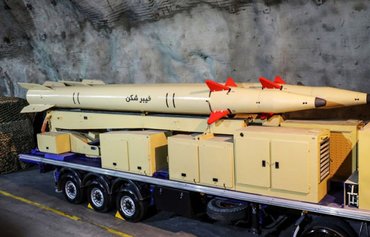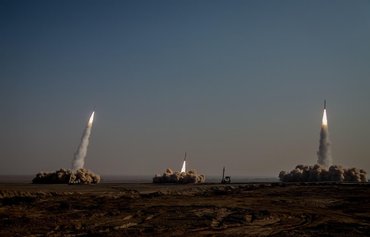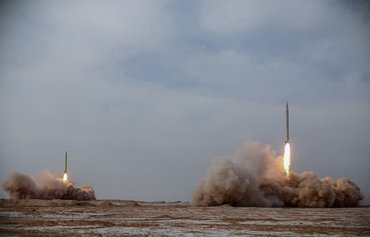The Iranian regime has long touted its missile arsenal as a deterrent force and defensive strength to be reckoned with.
But over the past decade, it has expanded the scope of its missile programme in ways that indicate expansionist goals and economic benefits are its true motivators, political analysts say.
Iran's arsenal comprises thousands of ballistic and cruise missiles, some capable of striking at least 2,000 kilometres away, according to independent analysts.
In January, Iran's Tasnim News Agency, which has close ties to the Islamic Revolutionary Guard Corps (IRGC), published photographs claiming to show vast underground "missile cities".
![Iran's Supreme Leader Ali Khamenei visits a missile site with IRGC Aerospace Force commander Brig. Gen. Amir-Ali Hajizadeh in an undated photo. [Photo via Fars News Agency]](/cnmi_di/images/2020/04/28/23474-Iran-Ali-Khamenei-600_384.jpg)
Iran's Supreme Leader Ali Khamenei visits a missile site with IRGC Aerospace Force commander Brig. Gen. Amir-Ali Hajizadeh in an undated photo. [Photo via Fars News Agency]
![New photos showing an Iranian 'missile city' were published on January 14th. [Photo via Tasnim News Agency]](/cnmi_di/images/2020/04/28/23691-Iran-missile-city-600_384.jpg)
New photos showing an Iranian 'missile city' were published on January 14th. [Photo via Tasnim News Agency]
The IRGC claims it has built three underground "missile cities" over the past six years, and earlier published photos of tunnels stacked with various missiles, Radio Farda reported.
Iran's missile depots are 500-metre-deep bunkers under mountains, in various parts of the country, IRGC Aerospace Force commander Amir-Ali Hajizadeh has said.
Arms to regional proxies
In addition to stockpiling weapons, Iran is a big proliferator of missiles and technology, with its partners and proxy militias, including Lebanon's Hizbullah and the Syrian regime, receiving a steady supply of Iranian-made arms.
Hajizadeh said in a 2011 interview with Tasnim that missile production factories were being built in Syria with the help of Iran, and that Iranian-designed missiles were being produced there.
Iran also has provided the Houthis (Ansarallah) in Yemen with increasingly advanced ballistic and cruise missiles, as well as long-range unmanned aerial vehicles (UAVs).
Iran-aligned Iraqi militias are the latest beneficiaries of Iranian-made rockets and other small projectiles, which they have used against Iraqi and US military and diplomatic facilities.
The IRGC's transfer of its missile technology throughout the region is a sign of Iran's plan to continue fuelling unrest and its preparation for potential conflict in the future, analysts say.
"The IRGC is concerned about a shift of equations in the region," said Iran-based political analyst Amir Reza Taghipourian. "The IRGC commanders' analysis is that a serious military conflict between Iran and the US will finally occur."
"The transfer of missiles to the region and reinforcement of its proxy militia forces is done so they will be able to use these facilities and spread war to the whole region," he told Diyaruna.
Taghipourian discounted this plan, however, as "a sign of the IRGC commanders' immaturity".
"If a conflict between Iran and the US occurred one day, Iran's regional network of allies would quickly disintegrate," he said, pointing to the fallout from the assassination of IRGC Quds Force commander Qassem Soleimani.
"With his death, Iran's influence among its allied militias diminished and they suffered from serious breakdown, and it is not even clear if this situation will be fixed," Taghipourian explained.
Ultimately, he said, Iran's so-called allies also have their own interests.
Political, economic interests
The growth of Iran's missile programme stems from the regime's expansionist ideology, "which has become part of its identity", Taghipourian said.
"But ideological claims are not the only reason for continuation of the expansionist policy," he said. "There are huge political and economic interests behind this venture."
"The IRGC, as a military mafia group, has taken Iran's political and economic interests hostage," Taghipourian said.
"The IRGC's missile programme has swallowed billions of dollars of the public budget in [recent] years," he added.
"On the basis of estimates that were released a few years ago, the cost of Iran's missile programme in 2017 was about $21 billion while Iran's total oil revenue in the same year was about $57 billion."
"For this reason, the IRGC's missile programme cannot be understood without considering economic as well as political interests."
Billions of dollars at stake
When it comes to Iran's military policies, there are major economic interests behind the scenes, Tehran-based political activist Siavash Mirzadeh told Diyaruna.
In addition to the cost of producing missiles, "hiding missile arsenals also costs billions of dollars, and IRGC contractors get paid several times the actual cost," he said.
"This is an important point for a country that hides its missiles inside its own territory and underground!"
"From Yemen to Syria and Gaza, all proxy groups supported by Iran receive these missiles," he said. "In some areas, the IRGC also has aided production of these missiles outside of Iran's borders."
"The cost of Iran's nuclear programme is billions of dollars more than the actual cost of setting up a nuclear power plant," Mirzadeh said. "These billions of dollars do not disappear, but are funnelled into the same mafia groups' pockets."
The IRGC encourages instability and conflict in the region as a way of expanding its influence, he said.
"As this mafia becomes larger, its revenue will increase and it will have the temptation to expand its influence to other parts of the world," he said.
"When you hear news about Africa or Latin America and realise that the Quds Force has also taken actions there, you should not be surprised."

![The IRGC unveiled its first secret underground missile base somewhere in Iran to state TV in October 2015. Since then, the IRGC has purportedly built three underground 'missile cities'. [Photo via Fars News Agency]](/cnmi_di/images/2020/04/28/23472-IRGC-underground-missiles-600_384.jpg)






